- Home
- Sam Siciliano
The Web Weaver Page 2
The Web Weaver Read online
Page 2
Despite Holmes’ description, I was not prepared for the bulk of the man who entered, his head barely clearing the doorframe. He wore formal dress, the ubiquitous black frock coat, waistcoat with gold watch chain showing, and striped trousers, the toes of his boots shiny, but all in all, he did not appear at home in his grand apparel. He had a slightly frumpled look, his tie askew, an errant lock of hair almost standing up.
At one time, he must have been a superb physical specimen, but now, nearing forty, he had the look of a man in transition toward corpulence. His shoulders were still broad, but his waist was thick, his neck too fleshy and full under the square chin. All the same, at a good six and a half feet tall, with an eighteen-inch neck, fingers thick as sausages, and a weight nearer three-hundred than two-hundred pounds, he was an imposing figure. His hair and mustache were light brown, his eyes blue, his skin fair with a tendency toward redness. His gaze shifted from me, to my medical bag, to my cousin.
“Mr. Sherlock Holmes?”
“Yes. I am he. What may I do for you, Mr.—?”
“Wheelwright, Donald Wheelwright.” His immense paw briefly swallowed Holmes’ long, delicate fingers.
“This is my cousin, Mr. Wheelwright. As you noted, he is a physician.”
Wheelwright’s hand now swallowed mine. It felt sweaty, big, very strong, and I noticed the reddish-brown hair on the back. “Dr. Watson,” Wheelwright said softly.
I raised my eyebrows. Holmes’ gray eyes had a wicked gleam, and he turned Wheelwright aside before I could apprise him of my true identity. A very faint, floral scent touched my nostrils. I glanced at my hand and sniffed cautiously. Lavender?
“Now then, Mr. Wheelwright, do be seated and tell me how I can be of service.”
Wheelwright sat warily, and the chair was dwarfed with him in it. He gave a sigh, and his mouth stiffened. “I— This is a black business, Mr. Holmes. I usually like to keep my affairs private, but... My safety and my wife’s safety are at risk, and the police don’t seem to be of much use. I didn’t quite know where to turn, but I was told you were the very best for this type of deviltry. I’m not superstitious, mind you, but all the same...”
“Who has threatened you, Mr. Wheelwright?”
His eyes showed a sudden coldness. “Who told you I had been threatened?”
“You did, albeit in a roundabout manner.”
He nodded. “I see. Well, there have been letters, and... See here, did you ever hear about the business with the gypsy at Lord Harrington’s ball?”
Holmes’ fingers tapped at his leg, and he frowned. “Was that nearly two years ago?”
“Yes, that’s right. Two years in January it will be. You know about it then?”
“Only vaguely. Something about a gypsy curse, was it not? I saw a brief article in one of the papers. Tell me about it, Mr. Wheelwright.”
Wheelwright sighed and shifted restlessly in the chair, which creaked ominously. “She was— There was this old hag. She appeared during the dancing. This was the Paupers’ Ball, and we were all in costume. She told us we should be ashamed—as if having money was a fault—and then she said how wicked we were. She had a piercing voice that got a grip on you, and at first no one was quite sure whether she was part of the entertainment. She came down the stairs and cursed everyone and wished the most terrible things on us all. And then...” His mouth stiffened, his brow furrowed, and he shook his head. “It was not wise. My wife tried to talk to her. The gypsy began to shriek at her. Finally, Harrington’s servants seized the gypsy and threw her out. The party was spoilt, though.”
Holmes gave a sharp staccato laugh. “Yes, I’ll wager it was. What did the gypsy look like?”
“Like a gypsy.”
Holmes forced a smile. “And what does a gypsy look like? What did this particular gypsy look like?”
“An old hag, as I said, in a bright dress—red, I believe. She had a hooked nose and bad teeth. Oh, and she wore big round golden earrings. What an old witch.”
“But her voice was piercing rather than feeble?”
“Oh, yes. Everyone in the hall could hear her.”
“And your wife confronted her?”
He gave his head a shake. “She was across the room from me, or I’d have stopped her. You don’t try to reason with a lunatic.”
“And what did Mrs. Wheelwright say to the gypsy?”
“She told her that our being dressed up meant no... disrespect, and that only the Almighty could punish, and she even...” He drew in his breath. “She asked the old hag to pray with her for God’s mercy.”
“And the gypsy did not take kindly to these suggestions?”
“No, she was still cursing my wife as they dragged her off.”
“What exactly was the nature of these curses?”
Wheelwright’s tongue appeared briefly at the corner of his mouth. “That she and all she knew would have bad luck, and... die in torment, and...” His face lost some of its earlier ruddy color. “And that she—my wife—would be... barren.”
Holmes took his elbows off his knees and sat back. “And by barren did she mean childless?”
Wheelwright nodded slowly. “Yes.”
Holmes tapped at his knee with his fingertips. “I do not wish to appear insensitive, Mr. Wheelwright, but it must be asked. Do you and your wife have any children?”
Wheelwright’s eyes narrowed, a brief hint of ice showing in their blue depths. “No. My wife... she is... But it was not the blasted gypsy!” His neck grew redder. “We already knew, long, long before the ball... I said I’m not superstitious, and I’m not.”
Holmes nodded thoughtfully. “How long have you been married, sir?”
“Nearly eight years.” Wheelwright seemed to grudge each word.
“I see. So the gypsy cursed your wife in particular and everyone else at the party. How very dramatic. The newspaper article comes back to me now. The curse involved general ruin, misery and misfortune, lingering illness, and early death, I believe. A crowd of London’s high society mesmerized by a vengeful gypsy who appears out of nowhere at the ball. Somewhat like Poe’s ‘Red Death.’”
“What’s this red death? I don’t recall her saying anything about any red death.”
“I was alluding to the story by Edgar Allan Poe.”
“Who’s he?”
“An American writer of some note. But we digress, Mr. Wheelwright. Something more immediate than the ball has brought you to see me.”
“That’s right, Mr. Holmes.” His big hands formed fists. “Some strange things have happened to several of the people who were at the ball. Harrington himself cut his own throat. It’s enough to make a man nervous. And then... then there was this note...”
Holmes placed his hands upon his knees. “Note? Let me see it, please.”
“It’s... it’s not very... nice.”
“I must see it.”
Wheelwright sighed, then reached into the inside pocket of his frock coat. Holmes opened the brown, folded paper, read it, then handed it to me. The writing was a reddish-brown color resembling dried blood:
By now you know my curse was a true one. Your womb is all ashes and bitterness, and you will have no fruit. Perhaps I shall send the Master himself to claim you. You may burn every light in your home as brightly as can be, but it will not save you from Him. Let your foolish God try to protect you now! Watch out for the black dog, the crow and the spider, for they be my allies. Know that nothing you can do will possibly save you. No man, no power, on earth can help the pair of you. You are doomed. You shall soon meet me and the Master in Hell.
A.
I shook my head. “What deranged creature can have written this?”
Holmes took the paper and held it up to the light. “It, too, is very dramatic, and this appears to be real blood. The aged parchment is a nice touch. I can see why this might unsettle you and your wife, Mr. Wheelwright. Did it come in the post?”
“No. My wife found it one morning.”
“Where e
xactly?”
“In the library.”
“And how did your wife react to this hateful note?”
Wheelwright hesitated, then shrugged. “She’s not the hysterical sort, but she doesn’t much care for it.”
Holmes’ smile was close to a grimace. “Of course not.” He sat back in his chair and regarded Mr. Wheelwright through half-closed eyes. The big man shifted about in the chair uncomfortably. It was small for him.
“So you have been married nearly eight years?”
Wheelwright nodded. “That’s right.”
Holmes’ eyes were fixed on him. “And I suppose you are... fond of your wife.” I could not be sure, but I thought I heard irony in my cousin’s voice.
“Fond enough. See here, Mr. Holmes, I didn’t come here to have you ask questions about me and my wife. I want this gypsy business resolved, but leave me and my wife out of it.”
“That may hardly be possible given that you both seem to be at the center of the affair.”
“All the same, I won’t tolerate questions about my personal affairs. Violet—my wife—is my business and my business alone.”
“Yes, yes, Mr. Wheelwright. You do understand that I will have to extensively question her and your household staff.”
I sat up abruptly. “Excuse me.” Wheelwright gave me a look, which suggested he had forgotten I was in the room. “Your wife is Violet Wheelwright?”
He nodded.
“We have not met before, but my wife is her physician—and her friend, as well. In fact, they are engaged in some charitable actions together today, if I am not mistaken.”
Wheelwright frowned slightly. “The lady doctor is your wife? But she has some French-sounding surname, not Watson.”
“I must clear up a misapprehension, sir. I am not Dr. Watson.” Holmes, I could see, was amused. “I am Dr. Henry Vernier. My wife is Dr. Michelle Doudet. She uses both our names: Doudet Vernier.”
“Ah yes, I forgot to mention Henry’s name, did I not? Now then, when may I question your household, Mr. Wheelwright?”
“Soon, Mr. Holmes.” He withdrew an ornate golden watch from his waistcoat pocket and opened it. “I’m afraid I must leave. I have other business. I shall send word.” He stood up and glanced about the room, obviously displeased with its untidiness.
Holmes also stood. “There is the matter of my fee.”
“I shall pay whatever you wish. Will five hundred pounds be enough of an advance?”
I was impressed, but Holmes nodded politely. “That will do nicely.”
“I have my checkbook. If you have a pen...” He started for the desk.
“You need not pay me now, Mr. Wheelwright. I only...”
Wheelwright had almost reached the desk when he suddenly turned and dashed back behind the chair, moving remarkably quickly for so large a man. His blue eyes were wild, his face very pale. He raised his hand and pointed his thick forefinger at the desk. “Kill it!”
I took a hesitant step toward him. “Are you well, sir?”
“Kill it. Take one of those papers and kill it!” His hand began to shake as he lowered it.
Puzzled, I gazed at Holmes.
“I am sorry to have alarmed you, Mr. Wheelwright. I shall dispose of the spider. You can send me a check later. I believe you said you had an engagement?”
Wheelwright kept his eyes fixed on the desk. “Yes, I do. You... you will be hearing from me, Mr. Holmes. You should... clean your desk.” He strode to the door, glanced behind him at the desk to make certain the spider was not pursuing him, then swiftly closed the door.
I shook my head and returned to my chair. “Your spider will cost you a client one of these days.”
Holmes also sat. “Elephants do not truly fear mice, but the relation in size is about the same with our Mr. Wheelwright and tegenaria. Perhaps I shall have to try to move her, if only for her own protection. Luckily he was too fearful to attempt to kill her himself. So, Henry, Michelle and Mrs. Wheelwright are friends, are they? And what is the lady like?”
“Not like her husband. She is of medium stature and slightly built, a brunette, a vivacious, amusing lady who is also quite beautiful. I would never have suspected such a husband.”
“What of her intellect?”
“She seems most intelligent. And Michelle is not generally fond of stupid women.”
Holmes gave a sharp laugh. “No.” He sighed and sat back in his chair. “I feared as much, but it does not surprise me.”
“Whatever are you saying?”
“It is regrettable she is married to such a man.”
“Come now, he may not have an impressive brain, but I am sure he is fond of her and a responsible husband.”
“No—no—no.” Holmes rose up in exasperation, then sat again. “Your responsible husband has just lolled away the afternoon with his mistress.”
I stared in disbelief. “What on earth are you talking about?”
“Henry, I begin to think you are as hopeless as Watson. Was it not obvious where Mr. Wheelwright had just been?”
“No.”
“Did you notice his dress?”
“He did seem... frumpled.”
“Exactly! One of his waistcoat buttons was unfastened, his tie was crooked, a button on his left boot undone, and his hair ruffled. Can you not surmise why?”
“Why?”
“Because he had been lying in bed with his mistress until the last minute. He then dressed in great haste and came to see us in his disordered state.”
I shook my head. “Perhaps he is just sloppy.”
“Did you notice the quality of his clothes and his watch? He is a rich man of business, and he would not make it through the day in so slovenly a state. To begin with, no valet of minimal competence would let his master out the door looking that way. Even if the man’s servants were incompetent, his colleagues would have discreetly mentioned that he might straighten his tie or button his waistcoat. He also smelled faintly of cheap perfume.”
I put my hand on my head. “I did smell something! Perhaps... perhaps he was with his wife.”
“Could you not tell from his manner that things are amiss between them? Besides, married people do not indulge themselves in the afternoon. That time of day is reserved for expensive harlots and their clientele.”
“Balderdash! That is simply not true.”
Holmes’ smile vanished, and he stared thoughtfully at me. “Is it not?”
“Well, I cannot speak for all respectable married couples, but... no, I think not.”
Holmes looked away, then scratched briefly at his chin. “I must defer to you on this, but you said his wife is with Michelle. Besides, I doubt his wife would use such foul perfume, not if she has any taste at all.”
I sighed wearily. I had only met Violet Wheelwright a few times, but I had liked her. Wheelwright, on the other hand... And if he were an adulterer, too... “I cannot believe it.”
“Henry, you should know how common such behavior is.”
“It may be common, but it is wrong. Blast it all, Violet is so pretty! Why would he trifle with a prostitute when he is married to a woman such as her?”
“Is that not also obvious? Because he is a dullard, Henry—a blockhead. Her beauty does not matter. He wants someone equally obtuse who will flutter her eyelids and tell him how handsome and clever he is. I doubt his wife would do that.”
I shook my head. “No.”
“Wheelwright seems a familiar name... Of course—Wheelwright’s Potted Meats! I’ll wager he’s that Wheelwright’s son and heir. The old man has a reputation for being shrewd and ruthless. I cannot picture the son maintaining the family empire. Perhaps there is an elder brother.”
“They are rich. Michelle commented on it, and Violet has been only too willing to purchase medicine, food, and clothing for the poor. You have put me in an awkward position, Sherlock.”
“In what way?”
“I do not like to keep secrets from Michelle, and what you have deduce
d about Mr. Wheelwright concerns her good friend. Should I tell Michelle, she may be similarly perplexed, but knowing her, she will want to tell Mrs. Wheelwright about her husband’s infidelity. Who knows what misery may then ensue?”
“Oh, nonsense.” Holmes crossed his legs, took his pipe, and began to cram tobacco into the bowl. “If Mrs. Wheelwright is anywhere near as intelligent as you claim, she already knows about her husband’s infidelity. In my experience, the wife usually knows about the mistress, and so long as the husband is discreet, not particularly abusive, and continues to make his income readily available, she does not much care.”
“What a horribly cynical viewpoint.”
“Marriage is the institution created for cynics, but do not blame me for your dilemma. Mr. Wheelwright is the guilty party. If he makes a habit of leaving his afternoon rendezvous in such disorder, then others must have remarked upon the fact. By the way, had you heard anything of this gypsy curse?”
“Not a word. That note was certainly vile. What do you make of it?”
Holmes drew in on the pipe. “Probably some discontented servant, nothing more. The whole business is far too melodramatic to be genuine. It reeks of artifice, of histrionics.”
“But what about the gypsy at the ball?”
“The author of the note probably has no relation to the gypsy, but that affair also seems suspicious. An old gypsy cursing all of well-to-do London is simply too dramatic, too sensational. I always suspect reports of anything even faintly supernatural, and this is very dubious. I shall be interested in meeting Mrs. Wheelwright and hearing her version of the events. Wheelwright certainly has no flair for storytelling.”
“I think she will please you. She is remarkably beautiful, but her wit and liveliness are what captivate one.”
Holmes laughed. “You make her sound a very paragon. I suppose I must guard my heart, for she is, after all, a married woman.” His irony had a weary edge.
I sighed but said nothing. I could think of no rejoinder.
“Do not tell Michelle, Henry. I would not have her worried as well. Perhaps in this case, I should have kept my deductions to myself.”
He rose, glanced out the window, then walked to his desk and examined the spider with his glass. “Her meal is half gone. My poor tegenaria, you had another close call. Luckily the massive Mr. Wheelwright was too cowardly to strike you. Come, Henry, cheer up. Would Michelle spare you this evening? I am tired and have not dined out in a while. A good piece of beef at Simpson’s would be the very thing. Given Mr. Wheelwright’s promised check, I can afford to be generous and feed an industrious physician.”

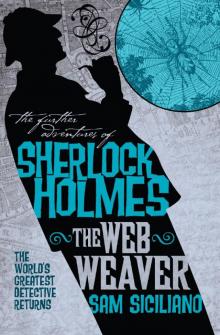 The Web Weaver
The Web Weaver The Further Adventures of Sherlock Holmes--The Devil and the Four
The Further Adventures of Sherlock Holmes--The Devil and the Four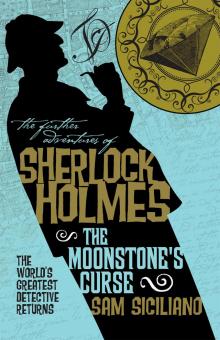 The Moonstone's Curse
The Moonstone's Curse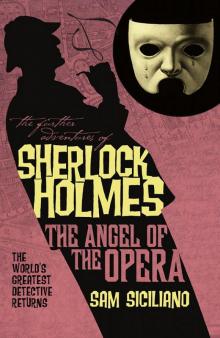 The Angel of the Opera
The Angel of the Opera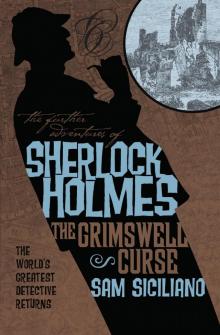 The Grimswell Curse
The Grimswell Curse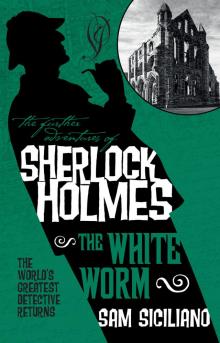 The White Worm
The White Worm